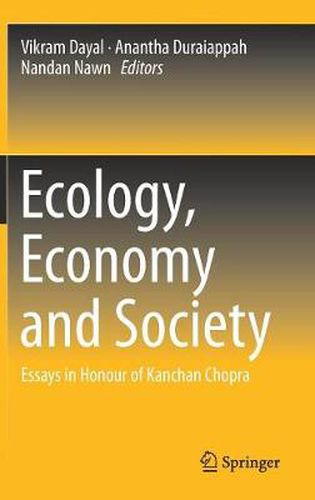Readings Newsletter
Become a Readings Member to make your shopping experience even easier.
Sign in or sign up for free!
You’re not far away from qualifying for FREE standard shipping within Australia
You’ve qualified for FREE standard shipping within Australia
The cart is loading…






This title is printed to order. This book may have been self-published. If so, we cannot guarantee the quality of the content. In the main most books will have gone through the editing process however some may not. We therefore suggest that you be aware of this before ordering this book. If in doubt check either the author or publisher’s details as we are unable to accept any returns unless they are faulty. Please contact us if you have any questions.
This book deals with not just complex linkages, interactions and exchanges that form the relationship between the economic activities, human society and the ecosystems, but also the influences and impacts that each causes on the other. In recent times, this ecology-economy-society interface has received unprecedented attention within the broader environment-development discourse. The volume is in honour of Kanchan Chopra, one of the pioneers of research in these areas in India. She has recently been awarded the coveted Kenneth Boulding Award by the International Society for Ecological Economics (ISEE) and is the first Asian to receive it.
The four sub-themes of the book reflect some of the important areas in the environment-development discourse - sustainability of development, institutions and environmental governance, environment and well-being, and ecosystem and conservation. Within each of the sub-themes, the policy and the practice as well as the macro and micro aspects are addressed. With contributions mainly from ecological economists and ecologists, the book’s approach is interdisciplinary, both in spirit and content, reflecting the honoree’s work, which went not just beyond the mainstream ideology of economics, but also the way she listened to ideas from disciplines like ecology and sociology. The volume also includes two reflective essays on academic life and works of Kanchan Chopra.
The book is a valuable resource for students, teachers, researchers, practitioners and policy makers in the areas of development economics, ecological economics, environmental economics and related disciplines such as conservation, development, ecology, economics, environment, governance, health, sociology and public policy.
$9.00 standard shipping within Australia
FREE standard shipping within Australia for orders over $100.00
Express & International shipping calculated at checkout
This title is printed to order. This book may have been self-published. If so, we cannot guarantee the quality of the content. In the main most books will have gone through the editing process however some may not. We therefore suggest that you be aware of this before ordering this book. If in doubt check either the author or publisher’s details as we are unable to accept any returns unless they are faulty. Please contact us if you have any questions.
This book deals with not just complex linkages, interactions and exchanges that form the relationship between the economic activities, human society and the ecosystems, but also the influences and impacts that each causes on the other. In recent times, this ecology-economy-society interface has received unprecedented attention within the broader environment-development discourse. The volume is in honour of Kanchan Chopra, one of the pioneers of research in these areas in India. She has recently been awarded the coveted Kenneth Boulding Award by the International Society for Ecological Economics (ISEE) and is the first Asian to receive it.
The four sub-themes of the book reflect some of the important areas in the environment-development discourse - sustainability of development, institutions and environmental governance, environment and well-being, and ecosystem and conservation. Within each of the sub-themes, the policy and the practice as well as the macro and micro aspects are addressed. With contributions mainly from ecological economists and ecologists, the book’s approach is interdisciplinary, both in spirit and content, reflecting the honoree’s work, which went not just beyond the mainstream ideology of economics, but also the way she listened to ideas from disciplines like ecology and sociology. The volume also includes two reflective essays on academic life and works of Kanchan Chopra.
The book is a valuable resource for students, teachers, researchers, practitioners and policy makers in the areas of development economics, ecological economics, environmental economics and related disciplines such as conservation, development, ecology, economics, environment, governance, health, sociology and public policy.